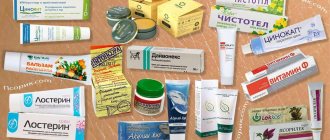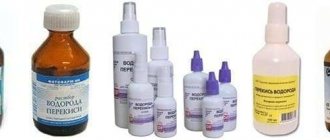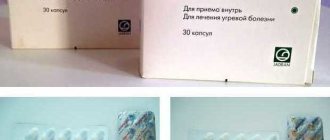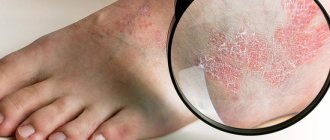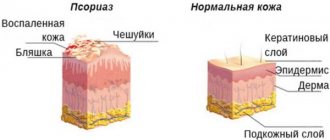Psoriasis is a systemic disease. Its main symptom is a rash on the surface of the skin, but this disease always affects the internal organs. In this regard, treatment must be comprehensive. Together with creams and ointments, you need to use medications that are taken orally.
Injections for psoriasis will help speed up the healing process as much as possible. Their main advantage is their quick effect. Medicines that are administered intravenously or intramuscularly almost immediately eliminate discomfort symptoms and improve the patient’s well-being.
Types of medications. What injections are given for psoriasis?
When choosing a treatment strategy and tactics, the following factors are taken into account:
- type of disease;
- age category;
- the presence of associated infections, concomitant chronic diseases, acute inflammatory processes;
- frequency and duration of relapses;
- size and location of affected areas.
Based on these parameters, the doctor decides which drugs and which method of administration are suitable for a particular patient.
For different forms of the disease, both oral and injection administration of the drug can be prescribed.
Injections for psoriasis have a number of advantages over tablets:
- the drug delivery route is shortened;
- the gastrointestinal tract is not affected;
- inflammation is quickly relieved, symptoms are mitigated, and remission is achieved;
Injections for the treatment of psoriasis combine several groups, different in principle and mechanism of action:
- Immunosuppressants are effective injections for psoriasis; their action is based on suppressing the body’s immune response. The advantages include mitigation of the symptoms of the underlying disease, the disadvantages are inhibition of hematopoietic function and the risk of developing secondary infections.
- Glucocorticosteroids are the main component of these medications, artificially synthesized hormones. They are used when all other means have proven ineffective. The advantages include rapid mitigation of symptoms, and in some cases, achievement of regression of the disease. The disadvantages are a list of contraindications and adverse reactions, the body’s addiction and the need to increase the dosage. You cannot inject them for a long time; over time, the body will require larger and larger doses.
- Antihistamines are drugs that block histamine receptors and suppress allergic reactions.
- Hepatoprotectors – means of protecting and restoring the liver; in severe processes that require taking a large number of medications, it is the liver that suffers first.
Medicines are produced in the form of suspensions and depot suspensions for injections, solutions for intravenous and intramuscular administration.
What injections are given for psoriasis, their names, therapeutic effects and contraindications are described in the table below.
| Drug name | Group | Therapeutic effect | Contraindications and side effects |
| Tavegil Suprastin | First generation histamine receptor blockers. | Antiallergic. Classic symptoms are reduced: itching, swelling and, to some extent, pain. |
Constant use causes an addictive effect. Taking even small doses is accompanied by drowsiness. |
| Heptral Heptor | Hepatoprotectors | Heptral
Heptor
| Heptral
Heptor
It is permissible to use the drug in the third trimester of pregnancy, subject to constant monitoring of the patient's condition. |
| Stelara Humira Remicade | Immunosuppressants | When carrying out the full course, long-term remissions are achieved; external symptoms completely disappear for a long time. |
|
| Diprospan | Steroid hormones | The use of hormonal therapy in the treatment of psoriasis quickly eliminates inflammation, external symptoms disappear completely. In addition, steroid hormones act as powerful immunomodulators, suppressing the activity of cytokines - conductors of the allergic reaction. |
|
Injections for psoriasis are an extreme case, “heavy weapons.” It is better to undergo treatment in a hospital. At home, success depends on self-discipline, that is, you cannot prescribe medications on your own; you cannot deviate from the dosage calculated by the doctor, up or down; You cannot skip or change your appointment time.
Another nuance is the unsafety of some injections. Thus, hot injections of calcium gluconate, used in Russian medicine for psoriasis, if injected incorrectly into a vein, cause burns and tissue death.
Read about hormonal lotions for psoriasis in the article - lotion for psoriasis.
Find out how to use the product correctly. What benefits do the components of the drug provide here - wax cream for psoriasis.
Anti psori nano scam or not. Read here - anti psori.
Hepatoprotectors
The condition of the liver plays an important role in the treatment of psoriasis, because it acts as a filter that removes toxins from the body. A group of hepatoprotective drugs is designed to reduce intoxication of the body.
Thanks to the antioxidant effect, cleansing occurs. The regenerative properties of the drugs help normalize liver function. These medications have virtually no contraindications, which makes them widely available for treatment.
Heptral
In addition to the hepatoprotective properties, the drug has antidepressant properties. Heptral promotes the regeneration of cell membranes. Already on the second day, there is a clear improvement in the condition of the liver, even with a disease such as cirrhosis. The antidepressant effect helps relieve the patient's state of nervousness and anxiety. The active component of the drug is ademetionine.
A medication course based on Heptral lasts at least two weeks, it all depends on the patient’s condition. The dosage is selected individually and depends on the patient’s weight. For better absorption of the drug, it is prescribed in combination with vitamin B12. Heptral is a rather strong drug, so it can cause a number of adverse reactions:
- Disturbances in the functioning of the gastrointestinal tract may occur: manifested in the form of diarrhea, nausea, abdominal pain;
- Weakness may appear;
- Dizziness;
- Muscle pain and cramps;
- Increased sweating;
- Weakening of the immune system.
The drug is contraindicated:
- Children under 18 years of age;
- In the first two trimesters of pregnancy;
- When breastfeeding;
- With poor absorption of vitamin B12;
- With poor heredity, in particular a violation of the methionine cycle, homocysteinuria or hyperhomocysteinemia.
The cost of Heptral starts from 1500 rubles.
Heptor
Produced in powder form for making a solution for injections. The main active ingredient is S-adenosylmethionine. The drug is able to replenish the deficiency of ademetionine in the body and promote its production in the brain and liver. Increases the level of glutamine in the liver, taurine and cysteine in the plasma. Relieves itching of the skin.
Heptor is contraindicated:
- When breastfeeding;
- In the first 6 months of pregnancy;
- Children under 18 years of age;
- In case of individual intolerance to individual components.
The drug is well tolerated, sometimes there is slight discomfort in the stomach, but this symptom goes away on its own and does not require exclusion from the therapeutic course. The duration of the course is determined by the attending physician, who also prescribes the dosage. The main thing is to avoid taking the drug in the evening, since the drug can have a tonic effect.
Immunomodulatory agents
Drugs in this category restore intercellular metabolic processes in the deep and superficial layers of the skin and increase the body's resistance to sensitization. Immunomodulators enhance the healing effect of phototherapy, a procedure necessary for psoriasis.
Pyrogenal
Injections for administration intramuscularly or using a dropper. They are well tolerated and allergic reactions almost never occur when using them. The minimum course of treatment is ten days, the maximum is a month. The drug is administered daily or every other day.
Milgamma for psoriasis, injections
A powerful remedy for the treatment of advanced forms of the disease. It is a complex of B vitamins. Milgamma injections have a beneficial effect on the central nervous system, increase blood flow, and slow down degenerative changes in the nerves.
The course is 10 days at a dosage of 2 ml.
If after treatment the patient shows residual signs of psoriasis, injections are given three more days a week.
Timalin
Timalin for psoriasis improves immunity; injections are prescribed when purulent and septic processes are added to the underlying disease. Thymalin injections have a beneficial effect on the process of hematopoiesis; the active substances seem to push the active forces of the body to fight pathogenic bacteria. Timalin activates the processes of phagocytosis - the absorption of inflammatory agents by blood cells. The course depends on the general clinical picture and the severity of external symptoms; is a minimum of 10 injections, a maximum of 30.
Glutoxim
Acts as an enhancer of hematopoietic processes, removes toxic substances from the body, protects liver cells from the effects of toxins and ensures their protection from the action of free radicals. The course of treatment is from 20 to 25 injections daily.
Useful properties of celandine, chaga, elecampane and milk thistle. Baths and compresses, side effects here - herbs for psoriasis.
Polysorb for psoriasis: how to take, contraindications, read here - Polysorb for psoriasis.
How it works and how to use psorimilk cream, composition, contraindications and price. Read here - ointment is the king of the skin.
Stelara
Stelara psoriasis injections are used for moderate severity of plaque psoriasis. A course of therapy is prescribed to patients if there are serious indications. The drug is administered subcutaneously with extreme caution in a hospital setting. The course of therapy consists of 4 injections at a dosage of 45 mg with an interval of 1 month. The drug has a list of contraindications for use:
- sensitivity to the components of the product;
- period of exacerbation of infectious diseases;
- oncological formations of a malignant nature;
- pregnancy;
- breastfeeding period.
There is a high risk of side effects. The price of the product is more than 258,000 rubles. per package.
Use of immunosuppressants
Immunosuppressants or immunosuppressants are drugs whose action is based on artificially reducing immunity. Since one version of the development of psoriasis is based precisely on a very strong immune response of the body, immunosuppressant drugs have been used in the treatment of the disease.
Immunosuppressants are divided into groups that differ in the final result:
- Non-selective drugs include drugs that completely suppress the immune system. The use of non-selective immunosuppressants poses a risk of developing infectious processes and exacerbation of chronic diseases.
- Selective drugs include drugs that select only certain immune cells. The risk of developing secondary diseases is reduced several times.
The most famous representatives of the group of immunosuppressants include Stelara, Timodepressin, Remicade.
Timodepressin
Acts as an immune inhibitor, suppresses the division of epithelial cells that is undesirable in psoriasis. The course of treatment is a week, followed by a two-day break and, depending on the result achieved, repetition or cessation of treatment.
Stelara
Stelara injections are used for moderate to severe disease. The course of treatment allows you to remove all external manifestations of the disease and get rid of terrible skin crusts.
The action of the drug is based on inhibition of the protein synthesis process. The injections are given according to the schedule prescribed by the doctor. 45 mg of medication is administered at a time, the next injection is given after 28 days. Further injections are carried out once every 2-3 months.
Reviews about stelara are varied and contradictory. Some patients achieved stable remission and forgot about itching, scratching, and red spots for months. Others did not feel any changes except for a decrease in the intensity of itching.
Remicade
The drug is available in powder form for infusion solutions and is prescribed when standard therapeutic methods are ineffective. Clinical studies have shown that Remicade injections reduce tissue infiltration and stop the inflammatory process. This medicine has proven itself very well in psoriatic arthritis, when after a course of treatment patients experienced severe swelling of the joints.
Treatment with glucocorticosteroids
Glucocorticosteroids are synthetic hormonal drugs. They can be produced in ampoules, in the form of an injection solution and suspension, in the form of tablets, lotions, and ointments. They are used when you need to quickly relieve pain, severe swelling or total tissue inflammation. They have an addictive effect, a lot of contraindications and side effects. Treatment of psoriasis with glucocorticosteroid injections is a last resort. There are no courses of treatment as such and can be only once a month.
Dexamethasone for psoriasis, injections
The course begins immediately with the highest dosage. The injection is placed directly on the affected areas. Injections quickly relieve inflammation, restore local blood flow, and normalize intercellular metabolism.
The following are considered unconditional contraindications for use:
- moderate and severe obesity;
- diseases of the renal and cardiovascular systems;
- ulcerative lesions of the gastrointestinal tract;
- persistently high blood pressure or changes in blood pressure.
Diprospan
A drug whose use causes a negative reaction from doctors and controversial attitudes from patients.
Diprospan injections relieve all allergic manifestations, have an anti-shock effect, and eliminate the inflammatory process.
On the other hand, its use provokes mental disorders, sleep disorders, and neurotic conditions. Patients may suffer from nausea, vomiting, diarrhea, and other gastrointestinal disorders. And, in addition to all of the above, metabolic processes are disrupted and patients gain excess weight.
Diprosalik
The composition, along with steroid hormones, includes salicylic acid. The formula of the drug is formulated in such a way that its use quickly relieves peeling, itching and swelling.
What is a hot injection and indications for using a warm injection
A hot injection is not just an injection, but a special procedure in which the patient experiences unusual sensations that can cause confusion and even provoke a panic attack. Such injections are part of treatment regimens for many pathological conditions. When performing an injection, you must strictly follow the instructions, because administration of the drug may also have undesirable reactions.
What are hot injections
Hot injections are called injections in which patients are injected with calcium chloride, which promotes rapid restoration of health in many diseases.
Thus, a hot injection into a vein is not a characteristic of temperature, but only the sensations that arise when the drug is administered.
Why is it called that?
This injection received this name not because the drug is heated before administration, but because of the unusual sensations that arise during this process. Patients feel that heat is quickly distributed through the veins from the injection site.
This type of injection is also called hot because it causes a burning sensation in some people. This reaction is due to the fact that the hot injection contains salts.
Why is it made?
Preparations based on calcium chloride have a pronounced antihistamine, anti-inflammatory, detoxifying and hemostatic effect. There are many indications for the use of this remedy. It is often prescribed when it is necessary to relieve allergic reactions, incl. manifested:
- angioedema;
- serum sickness;
- Quincke's edema;
- hives;
- skin rashes;
- hay fever, etc.
Often such injections are performed to improve the condition of patients suffering from insect bites, as well as in the presence of signs of drug intolerance. The injection is needed when it is necessary to quickly stop bleeding in case of traumatic injuries and during menstruation.
Calcium chloride is also useful if it is necessary to stimulate labor. It helps to open the cervix and enhance labor.
Calcium chloride is used to relieve symptoms of bronchial asthma.
A hot injection is often given to stabilize the condition of patients suffering from liver diseases such as toxic and parenchymal hepatitis.
The injection can also be beneficial for inflammatory kidney damage.
The administration of calcium chloride is performed for chronic skin pathologies, incl. eczema and psoriasis. An injection of the drug is prescribed for radiation sickness and hemorrhagic vasculitis.
A calcium injection is useful for a woman who has developed signs of eclampsia in the 2nd or 3rd trimester. In addition, injection administration is required in case of acute lack of calcium in the body. Often this procedure is prescribed to patients suffering from infectious diseases during the off-season.
Intravenous administration of calcium chloride may be recommended for many endocrine pathologies. In addition, the drug is prescribed to patients suffering from intestinal and biliary colic to eliminate discomfort.
Contraindications for use
Contraindications to the use of hot injections include chronic renal failure. Intravenous administration of calcium chloride is not recommended if the patient has signs of atherosclerosis. This drug is capable of dilating blood vessels, which can lead to the detachment of formed plaques and the formation of blood clots.
Such injections should not be performed if the patient has elevated calcium levels. Contraindications to the use of such injections include chronic pathologies of the cardiovascular system. The combination of hot injections with cardiac glycosides is especially dangerous.
The administration of calcium supplements to patients suffering from cancer is not recommended. Such injections should be used with caution if the patient has genetic pathologies.
How and where to do it
You need to give a hot injection intravenously. Calcium preparations can only be injected into large veins. Most often, the injection is made into the vessels located in the elbow joint.
If you administer a calcium solution intramuscularly, complications will develop. The main condition for the procedure is the slow release of the medication into the bloodstream. Ingestion of a large portion can cause a chemical burn to the walls of blood vessels.
Medicines are administered:
- jet;
- drip;
- through electrophoresis.
It should be taken into account that magnesia, which causes similar sensations when administered, can be injected both intramuscularly and intravenously. A solution of magnesium sulfate is used for pain relief, as well as to reduce blood pressure and temperature.
What complications can there be?
Hot injections under some conditions can cause great harm to the human body. If a calcium drug is accidentally injected into a muscle, necrotic lesions of soft tissue may develop.
Another common complication of administering medications with calcium is local edema. This effect is observed with chemical damage to the walls of a blood vessel. To eliminate signs of such a complication, you need to make an iodine mesh or an alcohol compress. You should not overexert your hand for several days. In most cases, all symptoms disappear after 4-5 days.
Often a large hematoma occurs in the area where the drug was administered. Such a violation is not uncommon when the drug is administered intravenously. In most cases, defects disappear after 3-5 days.
More dangerous complications of using injections include allergic reactions. To exclude such undesirable consequences, it is recommended to conduct preliminary tests to determine the presence of individual intolerance.
In rare cases, patients experience inflammatory reactions. They often develop due to air entering the vein. This condition is extremely dangerous, because... can cause vein blockage and be fatal. If this complication develops, the patient requires urgent medical attention.
The role of hepatoprotectors in the treatment of psoriasis
Drugs of this series play a protective and protective role. These are “rescuers” of the liver both from the effects of the disease and from the effects of medications containing toxic substances. Now Heptral and Heptor, drugs that have proven their effectiveness for psoriasis, are widely positioned.
Heptral
Heptral for psoriasis is used as a means of removing oxidants and poisons, reducing drug intoxication. Heptral injections have a beneficial effect on the biliary and nervous systems. Heptral occupies a leading place in the treatment of psoriasis.
However, now the opinions of patients are divided. The drug Remaxol, also belonging to the group of hepatoprotectors, was released. Medical data has appeared in the press and on the Internet that Heptral for psoriasis, despite its proven effectiveness, is inferior to Remaxol in some respects. Determining which is better, Remaxol or Heptral, can only be done experimentally.
Heptor
Facilitates the discharge of bile, reduces the risk of fibrosis - the formation of connective tissue on the liver, and prevents its obesity. Heptor can be injected either into a vein or into a muscle.
Antihistamines
According to one hypothesis, the psoriatic process is of an allergic nature. This version has neither been refuted nor proven, but it has been clinically confirmed that most medications taken for psoriasis contain substances that provoke allergic reactions.
Synthetic and natural antihistamines, including vitamins C, B12, zinc, and fish oil, can help soften the psoriatic process.
Antihistamines of the 3rd and 4th generations have now been released, but in the treatment of psoriasis, the highest priority is given to Kenalog, Tavegil, and Chlorpyramin.
Kenalog
A course of use allows you to say goodbye to allergy symptoms: itching, scratching, painful spots. Kenalog also acts as a mild analgesic and relieves inflammation. Injections are given only intramuscularly. The course of treatment is a week with twice daily administration. Unconditional contraindications are high blood sugar levels, infectious processes, and osteoporosis.
Tavegil
An old, proven remedy. Tavegil for psoriasis “extinguishes” all allergic symptoms. Obvious disadvantages include pronounced sedation, drowsiness and addiction. For moderate psoriasis, 2 injections of 2 ml are given.
Chloropyramine
The action is similar to that of tavegil. The difference is that the allergic reaction is not only suppressed, but its development is also inhibited. They give injections 2 times a day, 2 mg.
Using calcium gluconate for injections
In Russian clinical practice, hot injections of calcium gluconate are used for psoriasis. The name “hot” has nothing to do with the temperature of the drug administered. It earned its name due to the burning sensation that occurs in the mouth and the heat that spreads throughout the body. Hot injections soothe itching, relieve total inflammation, and rid the skin of plaques and crusts. The use of such injections requires experience and a careful and careful approach. Accidental penetration into a muscle threatens necrosis: the blood supply to the area damaged by the needle stops, and the surrounding tissues die. Before giving the injection, it is determined whether the patient’s body is susceptible to calcium gluconate. The injection is given very slowly. Rapid administration of the drug threatens cardiac arrest.
Hot injections of calcium gluconate are not given in cases of constantly high blood pressure or its changes, or diseases of the urinary system.
The dosage for an adult is 5-10 mg per administration. The injections are given for three weeks, three times a day.
Combilipen
It is a complex of B vitamins. The components include vitamins B1, B6, B12, each of which has unique features:
- B1 – saturates tissue cells with glucose;
- B6 – participant in the metabolic processes of the central nervous system; responsible for excitation and inhibition reactions;
- B12 is a “regenerating” vitamin; without it, complete tissue regeneration is impossible; it is involved in the process of hematopoiesis and increases the resistance of red blood cells to decay.
Combilipen is used for polyneuropathy, herpes zoster and psoriasis, and vitamin deficiencies.
For treatment, the drug is administered once a day for 5 to 10 days.
For prevention – once every 14 days. With a course of 3 to 5 injections.
Already on the second day of administration, the patient feels a surge of strength and vigor, his health improves significantly. However, this remedy has a number of contraindications and side effects: heart rhythm disturbances, allergic reactions, headaches and dizziness.
Immunomodulators
These drugs are used for exacerbations of psoriasis to relieve skin symptoms and achieve stable remission. They strengthen the immune system and improve metabolism. Contraindications: pregnancy, breastfeeding, hypersensitivity.
Timalin
The active component of the product is thymus extract, which is obtained from the thymus gland or thymus gland of large animals. The product improves cellular immunity. Dose for adults – 5-20 mg, no more than 100 mg per course. Treatment takes from 3 to 10 days.
Recommendations for injections
Psoriasis can and should be treated. A correctly selected course allows you to achieve long-term remission and forget about itching, pain, red, inflamed skin. It is only important to comply with simple conditions:
- Medicines must be injected according to the schedule, in compliance with the dosage prescribed by the doctor.
- Injections of complex drugs, the introduction of which can cause an undesirable reaction in the body, are carried out by a specialist.
- To avoid the development of an allergic reaction, the first use of the prescribed drug is carried out under the supervision of a specialist.
- Injections for psoriasis are the “heavy artillery” of psoriasis therapy, prescribed when all other local and general remedies have failed. Typically, indications include psoriasis of the joints or total psoriatic skin lesions.
- The easiest way to give intramuscular injections. They are placed in those places whose thickness is maximum. The subject of “execution” is most often the buttock, thigh or deltoid muscle of the arm. For a beginner, it will be easiest to inject in the buttock.
Injections for psoriasis are an effective and efficient remedy. But you cannot prescribe medications on your own and act on the principle “it helped my friend, and it will help me.”
Remicade
The active ingredient of the drug is the component Infliximab. It works as follows:
- eliminates inflammation;
- accelerates the healing process of rashes;
- relieves discomfort during arthropsoriasis.
In order to obtain a stable remission, 4 injections per year are sufficient. The administration method and the interval between injections are determined individually by a specialist for each patient.
The drug may cause adverse reactions:
- hives;
- slow heartbeat;
- anemia;
- gastrointestinal disorders;
- vaginitis;
- joint pain;
- shortness of breath.
Due to the high risk of side effects, injections of this substance can only be given in an inpatient department.
For reference! The cost of one package of the product is 50,000 rubles.
